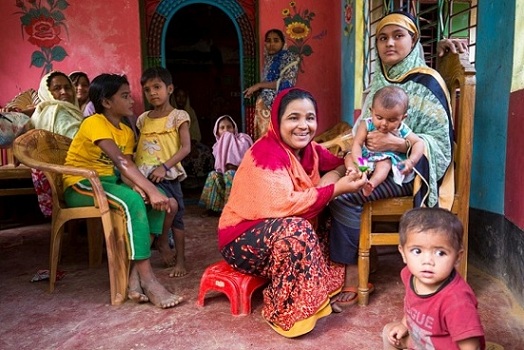
As thousands of Rohingya
refugees streamed into the Kutupalong
area from Myanmar last September, he did not hesitate when a group of exhausted
families asked if they could use some of his lands for temporary shelter.
“Seeing their sufferings, I
couldn’t bear it anymore, which is why I agreed to let them stay on my land,”
says the father of three. “Many of them brought rice on their own, I provided
them firewood and vegetables and fish.”
At first, Karim allowed 40 of
the families to stay in his home, surrounded by rice paddies, mangrove trees,
and vegetable plots. After nine days, the newcomers were able to build their
own makeshift shelters with materials provided by UNHCR, the UN Refugee Agency.
Among those Karim sheltered was
26-year-old Abul Manzur, who fled attacks by Myanmar troops and militia. He
trekked for weeks in search of safety before finally settling on Karim’s land.
“We have never been disturbed
by anyone since we got here,” says Manzur with evident relief. “We feel safe
and secure.”
More than 688,000 women,
children, and men have fled Myanmar since violence erupted there in late August
and Bangladeshis have been at the forefront of a huge relief effort, donating
food, clothing, shelter materials, and, in this corner of south-east Bangladesh,
the use of their land
“I could not bear the sorrows
that they were going through.”
A short distance away from
Karim’s home in the patchwork of villages around Kutupalong lives
mother-of-four Khaleda Begum. She is among many local people who responded to
the needs of footsore refugees in need of shelter by opening up their homes.
“They came with absolutely
nothing and I was truly shocked at seeing their condition,” recalls 26-year-old
Khaleda, who shared her family’s food, kitchen and beds with 36 refugee
families. “I felt their pain … I could not bear the sorrows that they were
going through.”
On their land, Khaleda’s family
cut down more than 250 fruit-bearing mango, jackfruit and guava trees to
accommodate the newcomers, among them several heavily pregnant women, four of
whom gave birth in the first few days.
Among the new parents were
Safita Begum, 18, and her husband, Mohammed Kausar, 22, who sought shelter at
Khaleda’s home on 2 September after barely escaping Myanmar with their lives.
Their daughter Rumi was born five days later.
“I am just happy and grateful
to Allah that I have escaped a tragic end to my life,” says Safita, who says
she wants a safe and secure future for her daughter.
Bangladesh is one of the
world’s poorest and most densely populated countries. The refugee influx in the
past six months has transformed the area of low hills peppered with villages
and hamlets around Kutupalong into the largest refugee settlement in the world.
The relief efforts of residents
like Karim and Khaleda are supported by the Bangladeshi government, in tandem
with UNHCR and its local and international partners.
“Until they feel safe to go
back, I will host them in my land.”
Nearly six months into the
displacement crisis, Khaleda’s family smallholding also hosts other facilities
including a child-friendly space provided by Save the Children International
and a clinic operated by the Bangladesh-based development agency BRAC. Both are
well used.
“Every day over 100 people come
here to use the health services”, said Mohammed Naimur Rahman, a medical
assistant from BRAC. “Though we provide very basic services, it is still very
useful for the refugees as it is very convenient to them.”
On Karim’s land, UNHCR and its
implementing partner Caritas have helped build shelters, tube wells, latrines
and bathing spaces to improve conditions for the refugees and reduce the risk
of waterborne diseases.
Several small engineering
projects are also under way to build bamboo-reinforced footpaths and stairs,
bridges and retaining walls for soil stabilization, and drainage networks.
Caritas has also installed street lights, which benefit residents and newcomers
alike.
With the influx, refugees
outnumber Bangladeshis in the settlement area. Their presence has contributed
to rising prices of staple foods, fuel and building materials and has caused
concern about pressure on the environment, leading to some protests. Neither
Karim or Khaleda doubt that they have done the right thing.
“Every day many Rohingya
refugee women and children come to our house now, and we enjoy their company,”
says Karim. “My children play with their children. They have new friends.
“Until they feel safe to go
back to Myanmar I will host them in my land.”
Khaleda says that before they
arrived, her neighborhood was isolated and quiet. She feels safer with new
neighbors living around her and enjoys hearing the laughter of their children.
“I feel happy that I could help
them when they needed it the most.”
Comments
Post a Comment